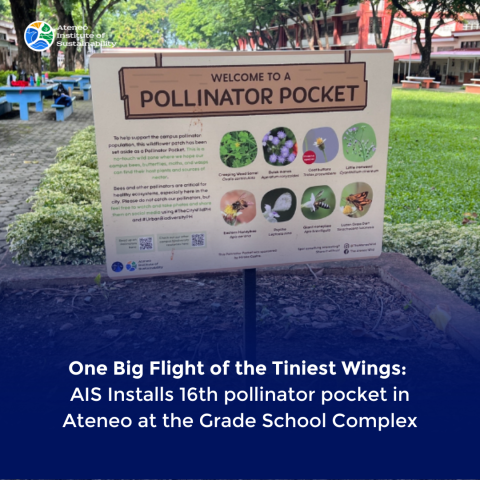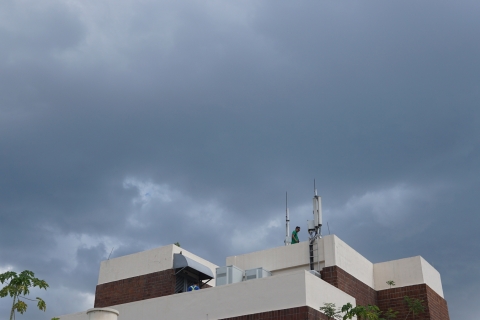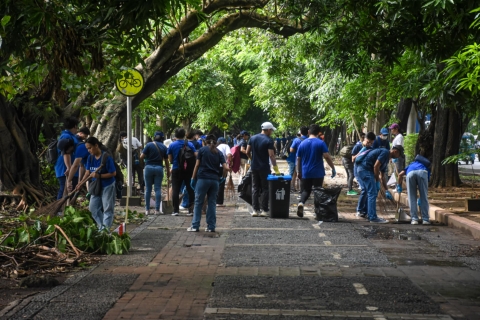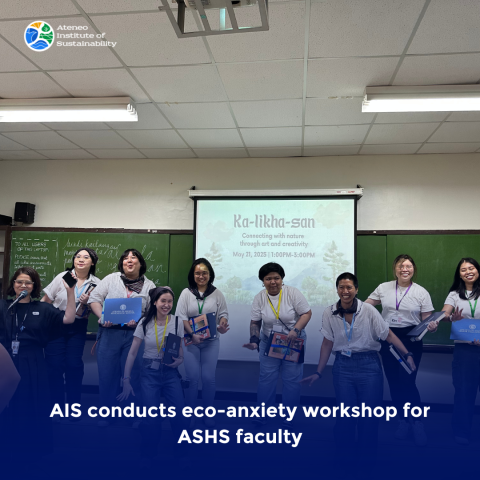MCR-Ateneo discussion on community empowerment marks Laudato si’ Week 2024
08 Jul 2024 | Maggie Ceniza, April Urbano, and Ivy Geraldine Ferrer
On 22 May 2024, the My Climate Risk – Ateneo de Manila University (MCR-Ateneo) Regional Hub, hosted by the Ateneo Institute of Sustainability (AIS), organized a panel discussion entitled "'Climate Voices on the Ground: Perspectives from Different Sectors,' A Laudato Si' Week Discussion." This event formed a part of the Laudato Si’ Week 2024 celebrations by the AIS, following the theme “Seeds of Hope.”
The theme is consistent with the aims of My Climate Risk, a lighthouse activity of the World Climate Research Programme, which aims to mainstream a bottom-up approach to regional climate risk. This panel discussion also follows from a similar event held in celebration of Laudato si’ Week last year, which focused on the first two Laudato si’ Goals: Response to the Cry of the Earth, and Response to the Cry of the Poor. This year’s Laudato Si’ Week event featured a panel discussion exploring the two bookends of the Laudato si’ Goals: Goal 1, and Goal 7, Community Resilience and Empowerment.
The panel discussion featured key speakers Dr Liza L Lim, Director of the Institute of Social Order, Inc and Chair of the NGOs for Fisheries Reform, Inc; Ms Violeta C Imperial, Social Responsibility Specialist at the Nature Awareness and Conservation Club, Inc and a Laudato Si’ Animator; and Ms Jessica Dator-Bercilla, Science Resilience Fellow of the National Resilience Council.
Dr Charlotte Kendra Gotango Gonzales, Director of the Ateneo Institute of Sustainability and Focal Point of the MCR-Ateneo Regional Hub, delivered the Opening Remarks. She noted how climate research must start with a good appreciation of the people and communities involved. She then connected this to the primary goals of the panel discussion in alignment with the specific Laudato si’ Goals of this year’s discussion, ‘Response to the Cry of the Earth’ and ‘Community Resilience and Empowerment,’ and how these mutually reinforce each other.
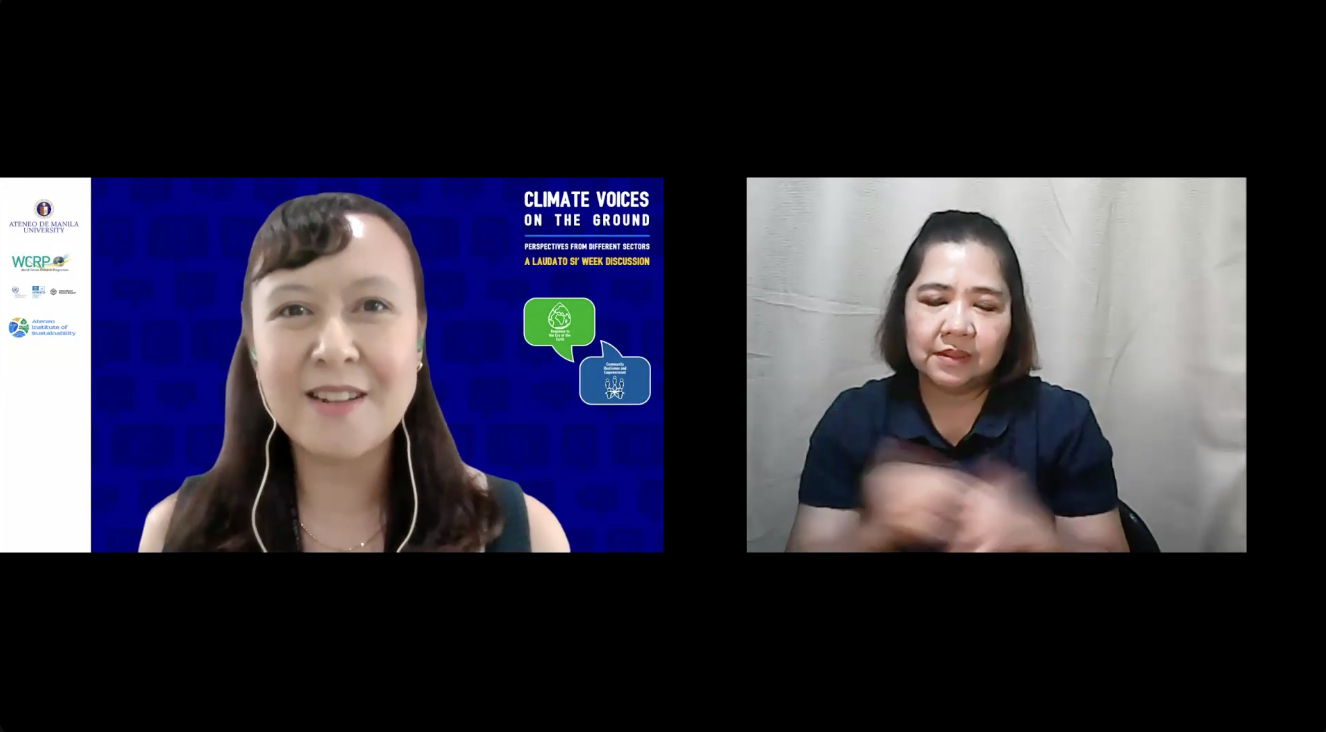
The first panel member, Dr Liza L Lim, focused on the work of her organization, the Institute of Social Order (ISO), which has extended help to the vulnerable and marginalized fisherfolk community since 1997. ISO employed the Social Transformation and Grassroots Empowerment Framework, which encourages participatory action research and a bottom-up approach that involves the community as co-producers of knowledge. Local research teams with first-hand experience and knowledge of their natural resources collaborate with community members, giving them the tools to find solutions and building a sense of ownership and responsibility for managing their resources. Dr Lim presented a successful example of this in Jomalig, Quezon, where researchers conducting a participatory vulnerability and capacity needs assessment map shared their research results with the community through information and education campaigns. From this collaboration, the community had the tools to lobby for environmental protection and rehabilitation, explore mangrove rehabilitation efforts, climate-smart agriculture, livelihood options, and disaster preparedness campaigns.
The next panel speaker was Ms Violeta Imperial, who shared her insights through a framing of the major sources of greenhouse gas emissions. She discussed the environmental and economic benefits of community-based tree planting, aligning it with Laudato Si’ Goal 1. Her organization, Nature Awareness and Conservation Club, Inc (NACCI), focuses on promoting environmental awareness by collaborating with science-based partners, government agencies, private companies, and community members. Through this, NACCI ensures the success of tree planting projects, which provide several environmental and economic benefits such as ecosystem integrity and biodiversity, increased fish catch, protection from disasters, and labor of transport and sale of seedlings. These harvested goods are then purchased by private groups, ensuring a sustainable economic cycle. Beyond this, the organization also hosts educational programs, conservation workshops, and pangkabuhayan (livelihood) outreach to guide these communities to become self-sustaining. Ms Imperial also emphasized the importance of companies interacting with and understanding the needs of the communities they wish to help to avoid unnecessary donations. Ms Imperial then concluded with a generic sample itinerary for their tree planting initiative, urging people from Metro Manila to adapt to the local community’s lifestyle and needs.
The last presentation was given by Ms Jessica Dator-Bercilla, who focused on small islands’ risk assessment, particularly following Typhoon Haiyan’s (local name Yolanda) devastation in 2013, which highlighted the vulnerability of communities, compounded by impacts like coral destruction. Her recent work in these islands, particularly in Iloilo City, showed evolving climate and human-induced hazards, such as inadequate adaptive structures and poor conservation practices, alongside social and cultural losses. Thus, the community developed an updated exposure and risk map to enhance their understanding of these issues. In Iloilo City, ongoing heat and drought underscored the need for detailed scientific data and the importance of a transdisciplinary approach to risk governance, which combines localized climate information with context-specific responses. An effective science community is crucial for helping people interpret scientific data, with frameworks like the Laudato si’ Goals and Sustainable Development Goals promoting inclusivity and gender equity. According to her, by adopting practices like bayanihan (mutual aid), communities can foster a more inclusive, responsive governance, ensuring that policies and programs benefit all stakeholders.
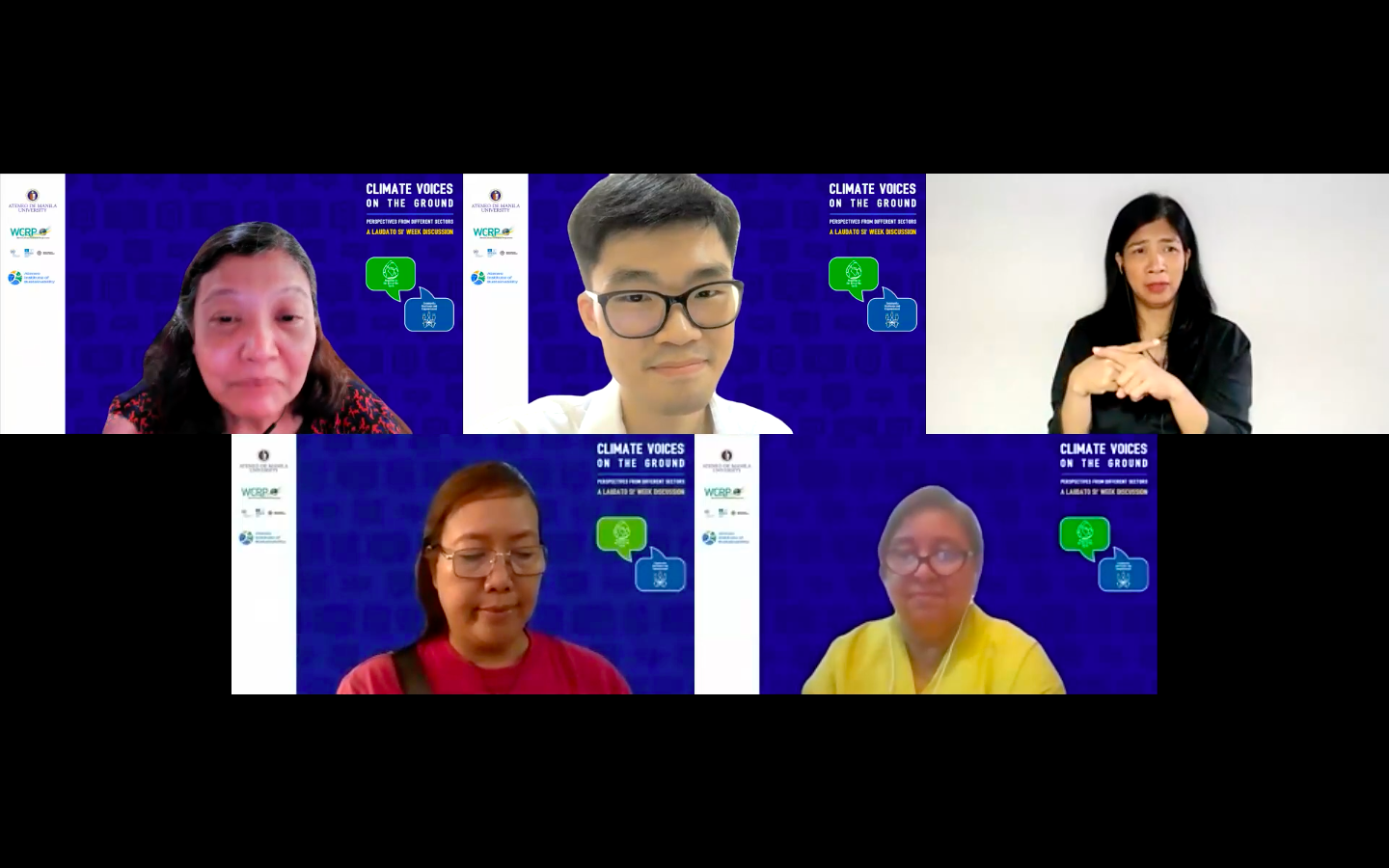
Closing the session was Ms Jean Jardeleza Mijaries, Program Manager for Climate and Disaster Resilience at the Ateneo Institute of Sustainability. She noted how these different projects encourage us to work with various communities and sectors and provide them with the tools and information they need to become self-advocates. This then ensures just and equitable climate action for all. The session was moderated by Mr Daniel C Ratilla, the Program Officer for Climate and Disaster Resilience at the Ateneo Institute of Sustainability.
The session was attended by participants from the Philippines, Ethiopia, and the United Kingdom. This panel session concluded the 2024 iteration of the webinar series “Climate Voices on the Ground: Perspectives from Different Sectors.” The replay and highlights of the event are available in the following page.



